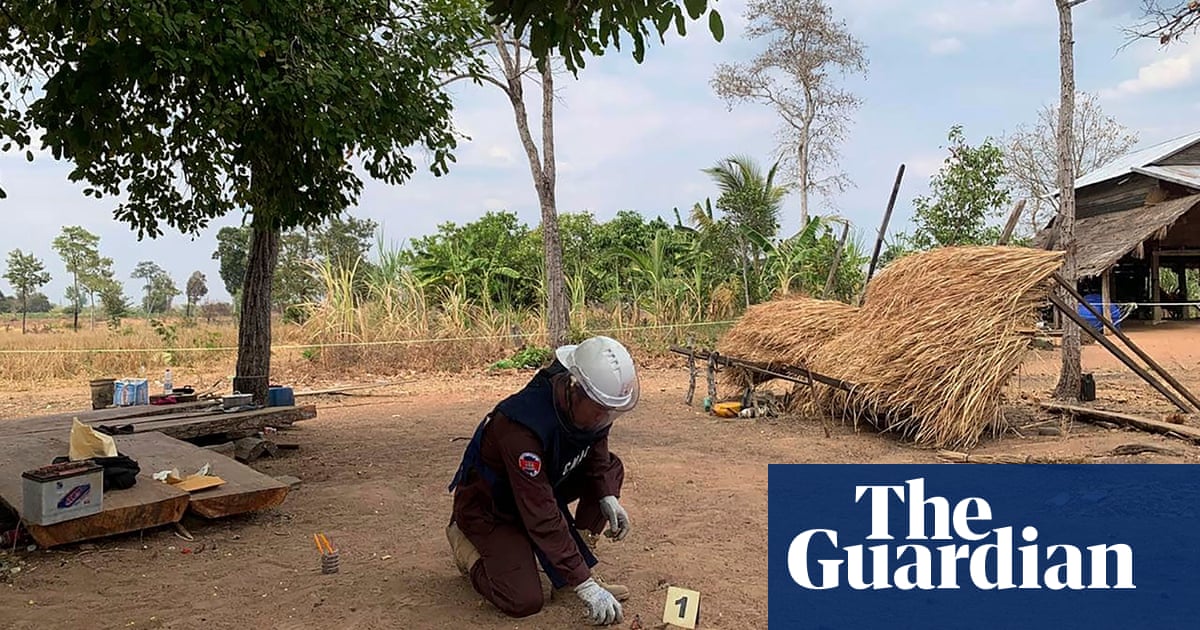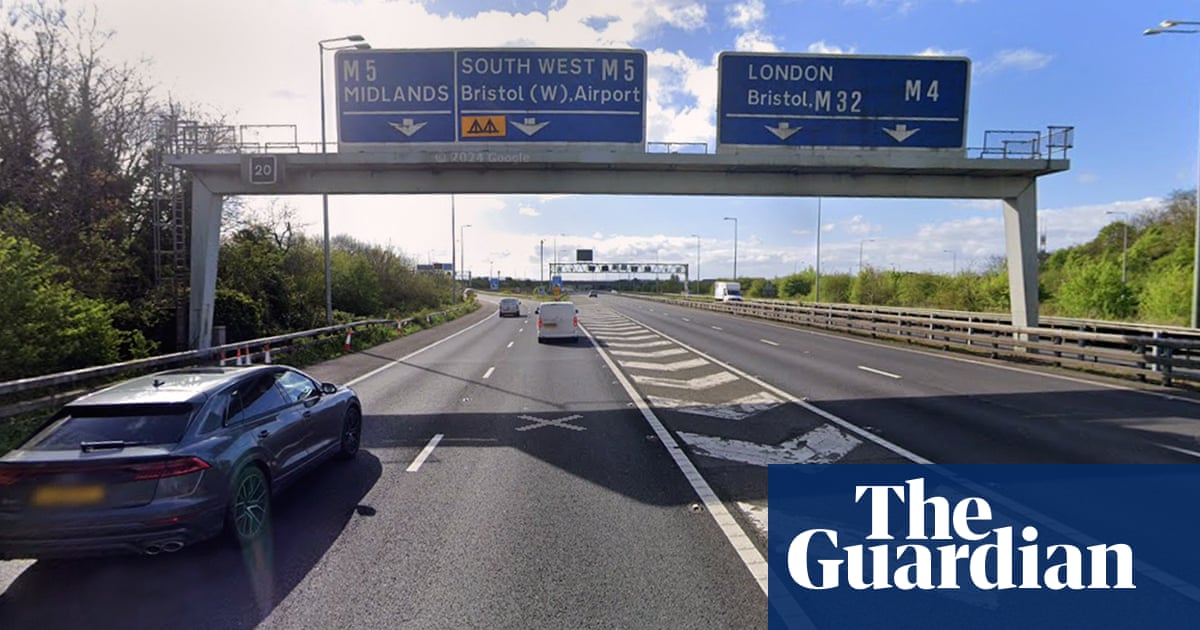Key events
Red Cross vehicles have now arrived at the site of the handover, live TV footage shows.
Hamas members have gathered in Gaza ahead of the handover:

Donna Ferguson
The BBC has been asked to remove a documentary about children living in Gaza from BBC iPlayer after it emerged the film’s 13-year-old narrator is the son of Ayman Alyazouri, a deputy agriculture minister in the territory’s Hamas-run government.
The corporation said that it had discovered the family connections of the film’s English-speaking narrator, a child called Abdullah, after the documentary was aired on BBC Two on Monday evening.
A new text attached to the film, Gaza: How to Survive a Warzone, reads: “The narrator of this film is 13-year-old Abdullah. His father has worked as a deputy agriculture minister for the Hamas-run government in Gaza. The production team had full editorial control of filming with Abdullah.”
The decision came after the connection was exposed in a blogpost by an antisemitism researcher, David Collier, on Tuesday and reported on in the Jewish Chronicle.
A group of 45 prominent Jewish journalists and members of the media, including present and former BBC staff, signed a letter to the BBC director general, Tim Davie, demanding the documentary be “removed” from iPlayer and questioning whether the film violated Ofcom rules.
Hamas offers handover of all hostages to Israel if next phase of ceasefire agreed

Julian Borger
Ahead of today’s release, Hamas said it is ready to release all its remaining hostages in a single exchange if the ceasefire agreement with Israel moves forward to a second phase next month.
The offer came as the Israeli prime minister, Benjamin Netanyahu, signalled his readiness to talk about a second phase of the Gaza ceasefire after an extended delay, by appointing one of his closest advisers, Ron Dermer, a US-born cabinet minister and former ambassador to Washington, to lead the Israeli delegation to the talks.
Dermer replaces the heads of the Mossad and the Shin Bet security service, who have led the negotiations until now and have frequently been at odds with Netanyahu over his reluctance to move forward with the ceasefire.
In the final steps of the first phase, Hamas will hand over the bodies of four Israeli hostages on Thursday, including those of two young boys from the same family. The group will release six hostages on Sunday and then transfer four more bodies next Thursday.
That will complete the first six-week phase of the ceasefire, due to end on 1 March, leaving a further 58 hostages in the hands of Hamas and allied militant groups in Gaza. Israel believes that 34 of the remaining hostages are dead.
The agreed plan for the second phase was for hostages and bodies of the dead to be exchanged for Palestinian detainees and prisoners in staggered groups. But Hamas suggested on Wednesday it was prepared to accelerate the process.
Opening summary
Hello, we are restarting our live coverage of the Middle East.
Hamas is set to return the bodies of four Israeli hostages on Thursday, including a mother and her two children who have long been feared dead and had come to embody the nation’s agony following the 7 October 2023 attack.
The remains to be released from the Gaza Strip are of Shiri Bibas and her two children, Ariel and Kfir. Kfir was the youngest captive taken that day. Hamas has said all three were killed in an Israeli airstrike early in the war. The militant group also plans to release the body of Oded Lifshitz, who was 83 when he was abducted.
“The heart of an entire nation breaks,” Prime Minister Benjamin Netanyahu said Wednesday in anticipation of the bodies being returned to Israel.
Thousands of people, including large numbers of masked and armed fighters from Hamas and other factions, gathered at the handover site on the outskirts of the southern Gaza city of Khan Younis, where large banners had been set up, including one showing an image of coffins draped in Israeli flags.
There were no plans to broadcast the handover live in Hostage Square in Tel Aviv, where Israelis have gathered to watch the release of living hostages. The square was empty as it rained on and off in both locations, which are about 100 km apart.
In other key developments:
-
Hamas has said it is ready to release all its remaining hostages in a single exchange if the ceasefire agreement with Israel moves forward to a second phase next month. A senior Hamas official, Taher al-Nunu, told Agence France-Presse “We have informed the mediators that Hamas is ready to release all hostages in one batch during the second phase of the agreement, rather than in stages, as in the current first phase.”
-
The offer came as the Israeli prime minister, Benjamin Netanyahu, signalled his readiness to talk about a second phase of the Gaza ceasefire after an extended delay, by appointing one of his closest advisers, Ron Dermer, a US-born cabinet minister and former ambassador to Washington, to lead the Israeli delegation to the talks. Dermer replaces the heads of the Mossad and the Shin Bet security service, who have led the negotiations until now and have frequently been at odds with Netanyahu over his reluctance to move forward with the ceasefire.
-
Arab leaders will gather in Saudi Arabia on Friday to counter President Donald Trump’s plan for US control of Gaza and the expulsion of its inhabitants, diplomatic and government sources said. The plan stirred rare unity among Arab states which roundly rejected the idea, but they could still disagree over who will govern the Palestinian territory and who will pay for reconstruction.
-
US secretary of state Marco Rubio met on Wednesday with the leader of the United Arab Emirates, Sheikh Mohammed bin Zayed Al Nahyan, after talks in Israel and in Saudi Arabia. The UAE has been key in mediating between Israel and Gaza. Wednesday’s meeting included discussions on artificial intelligence, the Gaza Strip, Syria, Lebanon and the Red Sea, which had been the site of attacks by Yemen’s Houthi rebels until the Gaza ceasefire a state department spokesperson said.
Article by:Source: Hamish Mackay














